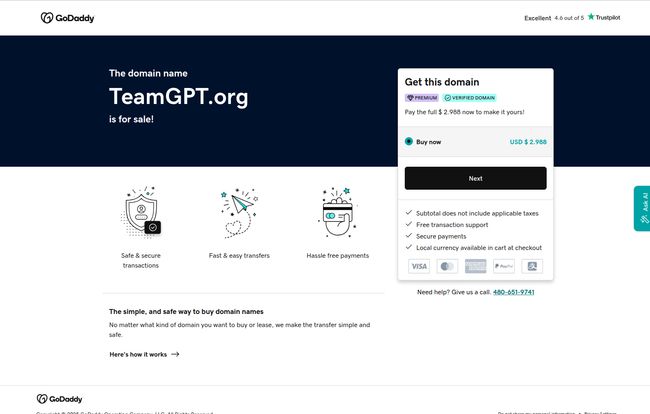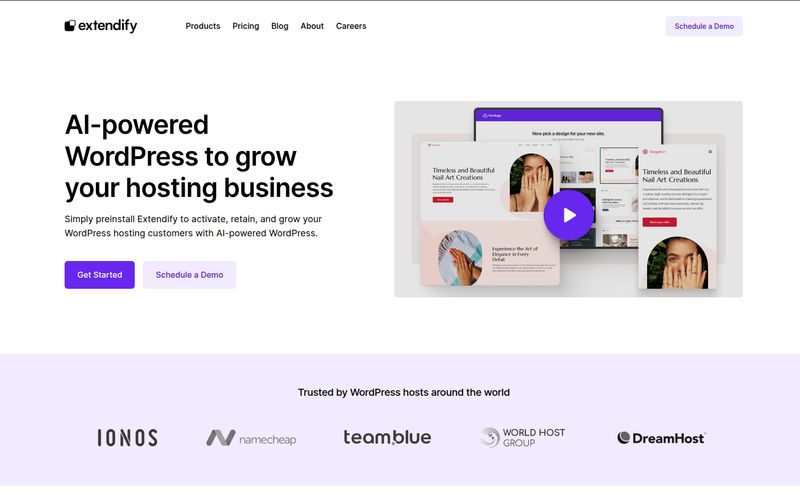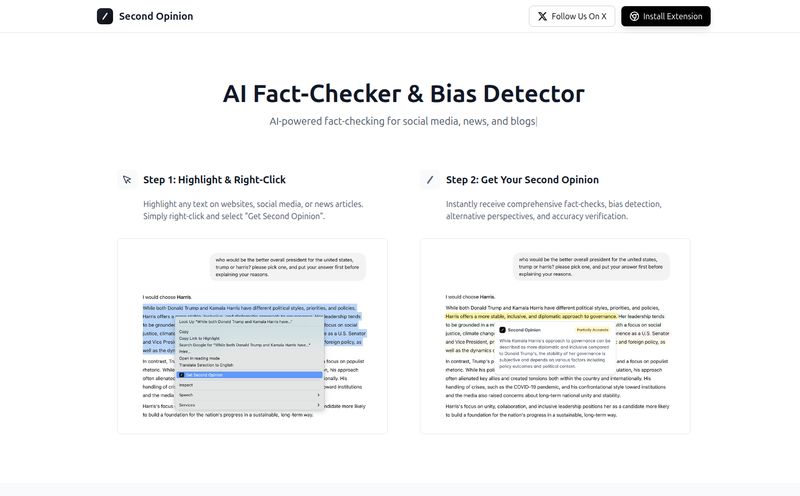I’ve been in the SEO and digital marketing game for what feels like a lifetime. I've seen trends come and go faster than TikTok dances. I've seen platforms rise like a phoenix and others, well, fizzle out like a damp firework. But every so often, a concept comes along that makes me sit up straight and say, “Now that is interesting.”
We're all getting used to using AI, right? It’s our research assistant, our brainstorming partner, our first-draft-writing intern that never needs coffee. But what if we could take it a step further? What if our AIs could form a team, collaborating with each other to complete complex projects? Imagine an AI writer finishing a blog post, then automatically passing it to an AI SEO specialist for optimization, who then hands it off to an AI social media manager to schedule a whole campaign around it. All while you’re, I don't know, actually taking a lunch break.
That's the glittering promise of a platform concept I stumbled upon called TeamGPT. The name alone is perfect. It paints a picture of a streamlined, automated, hyper-efficient future for freelancers and small agencies. I was intrigued. I was excited. And then I went to find it, and the story took a very, very strange turn.
So, What Was TeamGPT Supposed To Be?
Before we get to the plot twist, let's talk about the dream. Based on the breadcrumbs I found, TeamGPT wasn’t just another AI wrapper. It was envisioned as a complete, AI-driven workspace. Think of it less like a single tool and more like an AI project manager that hires, manages, and coordinates a team of specialized AI agents for you.
The core idea was to move beyond the one-on-one conversation we have with most AIs. TeamGPT was designed to facilitate advanced collaborative models between different AIs. You're not just giving one AI a task; you're giving a project to a whole team of them. A digital assembly line for creative and technical work. It’s a powerful idea, and one that feels like the next logical step in our workflow evolution.
The Features That Made My Inner Tech Nerd Drool
When I dug into the proposed features, I could really see the potential. It wasn't just a pie-in-the-sky idea; there was some real thought put into how this would actually function.
Collaborative AI Models and Smart Agents
This is the main event. The ability to have different AI models, each with its own specialty, working in concert. We all know the pain of prompt engineering—trying to coax the right response out of a general-purpose AI. TeamGPT proposed pre-defined AI Job Roles. You wouldn't just be talking to a generic bot; you could assign a task to the 'SEO Analyst' AI or the 'Content Strategist' AI. This would drastically cut down on setup time and, frankly, on the frustration of getting a marketing plan from an AI that's also trying to write a sonnet about cheese.
Personalized Insights and Action-Based Templates
Another killer feature was the promise of personalized AI insights. The platform would theoretically learn your workflow and start suggesting optimizations. It might notice you always follow up a blog post with five tweets and a LinkedIn summary and create an automated template for you. This is the kind of stuff that separates a good tool from a great one. It anticipates your needs. It's proactive, not just reactive. I’ve wasted more hours than I care to admit on repetitive administrative tasks, and the thought of an AI just... handling it... is music to my ears.
And Then There's... AI Bot NFT Minting?
Okay, I have to be honest. When I saw this feature, I raised an eyebrow. The ability to mint your personalized AI bot as an NFT. Is this a genius move toward digital ownership of customized AI assistants, or is it a slightly gimmicky attempt to cash in on the crypto hype? I’m leaning towards the latter, but I’ve been wrong before. Maybe in five years, we'll all be trading our highly-trained 'Senior Copywriter' AI NFTs for a premium. Who knows? It's a weird, wild idea, and I kind of respect the audacity.
The Big Reveal: A For Sale Sign on the Digital Doorstep
So there I was, fully bought into the concept. My mind was racing with possibilities. I was ready to see a demo, sign up for a beta, maybe even write a glowing review. I typed TeamGPT.org into my browser, hit enter, and was greeted by... a GoDaddy landing page.

Visit TeamGPT
That's right. The domain name is for sale. For the low, low price of $2,988.
I blinked. I checked the URL. Yep. All that potential, all that promise, and the digital real estate was empty. This isn't a review of a platform; it's an obituary for a dream. Or perhaps, an opportunity for a new one. What happened here? Was it a startup that ran out of funding? A brilliant idea that someone domain-squatted on speculation? We might never know. But it's a fascinating snapshot of the current AI gold rush—even the names themselves have a price tag before a single line of code is written.
Evaluating the Ghost of a Good Idea
Even though TeamGPT.org is an empty lot, the blueprint is still valuable. We can look at the pros and cons of the concept and see what it tells us about the future of work.
The Immense Potential
The advantages are pretty obvious. The cost savings could be massive for freelancers and small businesses. Instead of hiring multiple entry-level specialists, you could deploy a team of AIs for a subscription fee. The efficiency gains are just as huge. Automating the handoff between tasks—from writing to editing to publishing—would eliminate so many bottlenecks. It could genuinely allow a solopreneur to compete with the output of a small agency. That’s a powerful equalizer.
The Very Real Hurdles
Of course, it's not that simple. For one, a platform this complex would have a significant learning curve. You’d be managing a team, even if it is an AI one. Then there's the debate some people are having about AI and creativity. I’ve always believed AI is a tool, a phenomenal bicycle for the mind, but it’s not the rider. Over-reliance on it could lead to generic, soulless work. The human element of strategy, emotion, and true originality is still the secret sauce. And the biggest hurdle of all? Data privacy. Would you feel comfortable feeding your clients' sensitive information into a chain of interconnected AIs? That’s a massive trust barrier that any platform like this would need to address with Fort Knox-level security and transparency.
Who Should Buy This Domain and Build This Dream?
So, is that $2,988 price tag a good deal? In my opinion, for a name this brandable in the hottest sector on the planet, absolutely. This is an idea waiting for a home. A major company could swoop in and build this out, or a hungry startup could make it their mission. The target audience is massive: millions of freelancers, content creators, marketers, and small agencies are desperate for tools that save them time and make them more money.
The concept of TeamGPT is more than a domain name. It’s a signpost pointing to where our industry is heading. Whether it gets built at that URL or by someone else under a different name, the multi-agent AI workspace is coming.
Frequently Asked Questions about TeamGPT
What is the main idea behind the TeamGPT concept?
The core idea is to create a collaborative workspace where multiple specialized AI agents can work together on complex projects, automating the workflow between tasks like writing, editing, SEO analysis, and social media posting.
Is TeamGPT a real, usable platform?
As of late 2023, the platform as described does not appear to be active. The domain name TeamGPT.org is currently listed for sale on GoDaddy, suggesting the project is either defunct, was never launched, or someone is holding the name.
What are the standout proposed features of TeamGPT?
The most compelling features include collaborative models between different AIs, an extensive library of predefined 'AI Job Roles' (like a 'Data Analyst' or 'Copywriter'), smart prompt suggestions, and personalized insights to help streamline your workflow.
What does 'AI Bot NFT minting' even mean?
This was a proposed feature that would allow users to create a unique, verifiable digital token (an NFT) of their customized AI bot. In theory, this could represent ownership over a highly trained, personalized AI assistant, but its practical application is still speculative.
Are there alternatives to the TeamGPT concept available now?
Yes, the concept of AI agents working together is emerging. Tools like AgentGPT and frameworks like Auto-GPT are exploring autonomous AI agents. However, a user-friendly, commercially-focused freelance platform like the one TeamGPT described is still a developing area.
How much does the TeamGPT.org domain cost?
According to the GoDaddy listing, the domain name TeamGPT.org is for sale for $2,988.
An Idea Waiting for a Champion
So, we're left with a great name and an even better idea. TeamGPT, the platform, may just be a ghost in the machine for now. But the concept is very much alive. It represents a future where freelancers can scale their operations in ways we could only dream of a few years ago. It’s a future of interconnected, specialized AI assistants working as a cohesive team.
It’s a powerful vision. So, anyone have a spare three grand and a desire to change the future of work? The opportunity is right there, waiting.
Reference and Sources
- Domain Listing: TeamGPT.org on GoDaddy (Archived information based on the provided image)
- Example of AI Agent Technology: AgentGPT
- Further Reading on Multi-Agent Systems: IBM - What are Multi-Agent Systems?



